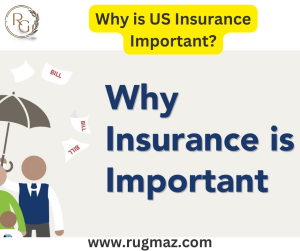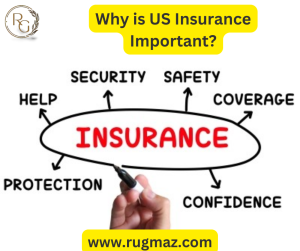Why is US Insurance Important?
Why is US insurance important? The uninsured often face expensive medical bills. Private health insurance helps those with insurance to access health care at a reasonable cost. Without insurance, people often cannot afford to see a doctor. Without health insurance, these costs can become too high to cover. The cost of insurance is one of the top reasons to have health coverage.
The higher the deductible, the lower the premium. But what is the cost of health insurance, and why is it so important?

Uninsured people face unaffordable medical bills
Medical bills for the uninsured can run up to $20,000 or more. Many times, the cost is even higher. According to experts in medical billing, uninsured people are the most likely to suffer from financial hardship after a medical emergency. The No Surprises Act took effect on Jan. 1, but the law doesn’t shield uninsured patients from unaffordable medical bills.
Health insurance plans often leave enrollees with substantial healthcare costs. This can cause credit card debt, which can affect a person’s ability to pay for basic necessities. Ultimately, unaffordable health care has consequences for everyone’s health. Healthcare affordability has become more important than ever. Considering the rising cost of health care, it’s no wonder so many people are facing financial difficulties.
According to the HCUP Nationwide Inpatient Sample, the proportion of hospital bills that uninsured families can afford to pay increases with income. Uninsured families earning 400 percent of the FPL could afford 37% of hospital bills, but this number is much lower among families with high incomes. But even the high-income uninsured patients can’t afford to go to the hospital because they lack sufficient financial resources to pay their medical expenses.
One reason many people are uninsured is the cost of premiums. The CBO found that one-third of uninsured adults would need to spend more than 10% of their income to purchase health insurance. For many people, these thresholds are too high, so they don’t buy them. Some individuals cannot spend 5 percent of their income on health insurance. However, it’s not impossible to buy coverage for just 5% of the income.
Another factor that makes the difference between insured and uninsured people in terms of access to health care is employment status. People with employers who provide coverage to their employees are less likely to be uninsured, although people who work full-time are less likely to enroll in Medicaid. Even families with full-time workers are nearly as likely to be uninsured as those who don’t work. Moreover, part-time workers, who made up five percent of the nonelderly population, were more likely to be uninsured than full-time employees.
The duration of uninsured status impacts the amount of financial risk and access to health care. For example, if a person becomes uninsured in January of the first year and is uninsured throughout the year, it’s likely that the individual will face unaffordable medical bills for the entire year. Similarly, if the person goes uninsured from July to December, the cost of routine care is low, but they may face a longer spell.
Private health insurance facilitates access to care
Health insurance facilitates access to care by providing financial protection against the high cost of medical care. It provides coverage for both modest and high medical expenses. It also facilitates entry into the health care system, because those without insurance do not have access to health care. In addition, uninsured patients are less likely to receive recommended health screenings and preventive services. Moreover, insurance facilitates the workforce’s skills and competence, as it provides a broader range of services.
Uninsured adults are less likely to report excellent or perfect health than those insured. As a result, they may delay receiving treatment until the condition becomes unbearable. While it is possible to get health care for or at subsidized rates, many people lack insurance for a variety of reasons, including lack of transportation, illiteracy, and cultural differences. Despite these issues, access to care remains heavily dependent on health insurance.
The high number of uninsured people has significant implications for the healthcare system, both for individuals and for communities. The high rate of uninsured people puts stress on the system as they often put off needed care. This results in more patients visiting hospital emergency rooms for preventable conditions. Additionally, the high cost of care can lead to significant financial burdens on individuals and communities. For these reasons, private health insurance is vital to improving access to care in the United States.
Traditionally, insurance benefit designs offer the same benefit structure to all enrollees. Consumer cost-sharing is usually uniform, regardless of need, and is typically based on the acquisition cost of a healthcare item. This one-size-fits-all mentality creates deeply unjust outcomes. For example, the traditional tiered pharmacy benefit treats life-saving cardiac drugs the same as a benign toenail fungal infection.
The first formal studies on uninsured populations began in the late 1920s. The Committee on the Cost of Medical Care conducted a series of reports about the financial burden of physician office visits and hospitalizations. This issue became acutely relevant during the Great Depression when the number of medically indigent people grew. And, the debate over private health insurance in the US has continued for decades.
While the cost of care remains the most important consideration in private health insurance, it is not the only cost of care. Deductibles, coinsurance, and copays are additional costs associated with medical care. These represent the percentage of the patient’s cost that is covered by the insurance plan. Therefore, paying more upfront may result in lower costs later. The same principle applies to Medicare. However, it is important to understand that health insurance does not cover everything. Hence, private health insurance can help people access health care and avoid unnecessary costs.

It facilitates access to care for those with insurance
While the number of people without health insurance in the U.S. is increasing, the percentage of uninsured individuals is also rising. While a significant number of people do not have health coverage, there are a number of reasons why a high-quality health insurance plan is important. It facilitates access to care, supports positive health outcomes, and reduces the financial burden of healthcare for individuals.
While the high rate of uninsured Americans may be a cause for worry, they are also putting stress on the healthcare system as a whole. Because they do not have insurance, many people put off needed care and rely more on emergency rooms. This puts a tremendous financial burden on the healthcare system and impacts communities. Without insurance, many people are unable to get the care they need.


I am a student of BAK College. The recent paper competition gave me a lot of headaches, and I checked a lot of information. Finally, after reading your article, it suddenly dawned on me that I can still have such an idea. grateful. But I still have some questions, hope you can help me.
I may need your help. I’ve been doing research on gate io recently, and I’ve tried a lot of different things. Later, I read your article, and I think your way of writing has given me some innovative ideas, thank you very much.